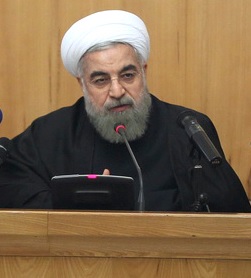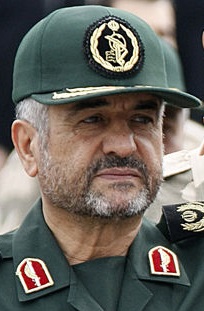On November 8, President Hassan Rouhani challenged the escalating crackdown on journalists and businessmen, many of whom have links to the United States. He
called for transparent media regulations at the opening of a press exhibition in Tehran. “We also need a clear law for press and media, thus, as far as the law is clear and unambiguous, no one can stick to a part of it and play with or misuse people's rights of freedom of press in the society,” he said. Rouhani said that it was a shame that no Iranian publication had lasted as long as
The New York Times. He contended that shutting down a newspaper should be the last resort for the judiciary.

Rouhani alluded to the wave of recent arrests while seeming to criticize newspapers with close ties to security services. “By reading their headlines you know who will be arrested tomorrow.” The president warned that “trying to discredit people is against Islamic values.” Rouhani also
said that clearer regulations “will stop certain people picking up on a word or a sentence in a media outlet and putting their freedom at risk.”
Rouhani initially indicated his disapproval of the arrests on November 4. “Let us not go and arrest one person here, another there, based on an excuse and without any reason, and then make up a case and aggrandize it, and finally say this is an infiltration movement,” Rouhani said, in a speech commemorating the 36th anniversary of the U.S. Embassy seizure.
Rouhani warned against abusing guidance from Supreme Leader Ayatollah Ali Khamenei to further other personal or political goals. After the nuclear deal, Khamenei advised Iranians to be vigilant against U.S. economic, political and cultural influence. Rouhani admonished, “Some should not want to, God forbid, misuse these words and terminologies and accuse those who are opposed to us and drive them to the margins… We need to try to develop an accurate understanding of and implement what the Supreme Leader says. We should not let certain individuals use his words to score personal, collective and factional points.” In the past, hardliners have claimed that Rouhani’s government had breached Khamenei’s redlines.
Rouhani countered that Iranians are sophisticated enough to recognize U.S. interests. “People properly know the meaning of influence and arrogance and know the history of American mistreatment with their country and the people,” he said. “They can rightly recognize their national interests and their country’s future. We should seriously
fight against foreigners’ influence, and no one should play with the word ‘infiltration.’”
The arrests, reportedly by the Revolutionary Guards (IRGC), reflect the growing anti-Americanism among hardliners, after the historic nuclear deal and in the run-up to pivotal elections. Hardliners fear new diplomacy with the United States could compromise the revolution, or their own interests, especially amid predictions they could lose their decade-long control of parliament in the February election. “People are well aware of the situation and monitor what is unfolding, and knowingly make their presence felt when it is needed – like in elections – and speak their mind,” Rouhani said.
The two businessmen arrested since mid-September both have strong connections to the United States:
- Nizar Zakka, a Lebanese national and permanent U.S. resident, is an information and communications technology expert. Invited by the government, he was in Tehran for a conference on business. He was detained on his way to the airport on September 18. He has since been was accused of espionage for the United States.
- Siamak Namazi, a Dubai-based consultant, was born in Iran but grew up in the United States and became a U.S. citizen. He attended Tufts University and Rutgers. The energy specialist has long held that Iranian-Americans could help foster rapprochement between Tehran and Washington. He was visiting family in Iran when he was arrested mid-October.
Five Iranian journalists were
reportedly arrested on November 2. Four have been publicly identified:
- Issa Saharkhiz,a veteran journalist and political activist, has been accused of “disrespecting the Supreme Leader,” trying “to overthrow the government,” and plotting “to hold mass demonstrations against the government.”
- Ehsan Mazandarani is the managing editor of the newspaper Farhikhtegan.
- Saman Safarzaie is a member of the editorial board of the monthly Andisheh Pouya.
- Afarin Chitsaz is a member of editorial board of Iran newspaper.

The journalists’ detention coincided with a conference organized by the Basij militia and
described as “the first anti-American gathering after the nuclear agreement.” At the event, IRGC chief General Mohammad Ali Jafari
warned that the United States is scheming to take advantage of negotiations and infiltrate Iran. “The enemy has started its work,” he
said. On November 4, the IRGC announced the break-up of an American and British
network behind a media campaign against Iran.
Photo credits: President.ir

